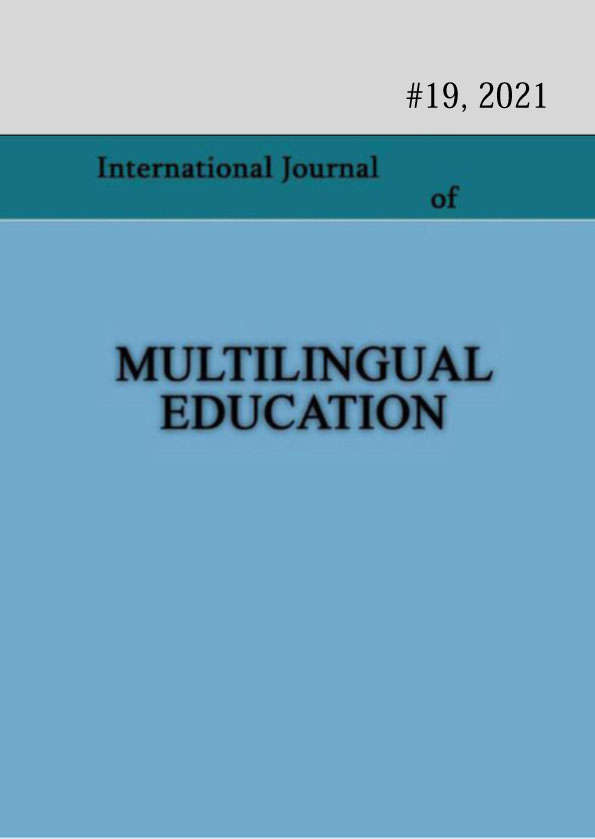Problems of teaching verb categories (contact, version and passive voice) of the Georgian language to non-native speakers
Keywords:
Georgian, contact, version, passive voice, formation.Abstract
Teaching Georgian to non-native speakers, it is important to focus on categories students' first languages lack or express them in a different way. The paper discusses the formation of indirect contact, neutral version, and passive voice in verbs.
Infixes -in- and -evin- are used to form forms of indirect contact. They are added to infinitive forms without markers - -in- is used with stems containing vowels, and - evin- with stems without vowels. At the same time, prefix a- is added to verbs at the beginning, and the thematic marker -eb at the end. Like all other thematic markers, the latter disappears in the second series of conjugation.
Deriving version forms is a little more complicated, as there are neutral version forms without markers and with the prefix a-, subjective and objective version forms with the prefix i- for the first and second persons and u- for the third person in both singular and plural forms.
Neutral version is formed with the prefix a- in verbs with eb- and ob- thematic markers apart from several exceptions and verbs with the am- thematic marker, apart from one exception (as version is impossible in the third series of conjugation, examples are in the first and second series of conjugation): a-šen-eb-s - a-a-šena, a-tb- ob-s - ga-a-tbo, a-b-am-s - da-a-ba).
Thematic markers make no difference in forming subjective and objective version forms. If a verb is semantically able to have subjective and/or objective versions, verbs in the first and second series of conjugation take forms of subjective and/or objective version.
Forms of subjective version use prefix i-: c'ers – i-c'ers, dac'era – da-i-c'era.
In forms of objective version, verbs take the prefix i- in the first and second person and u- in the third person, both singular and plural. Like in the forms of indirect contact, the aforementioned rule of using person markers can be put to use: m-i-c'ers is me, g-i-c'ers is šen, u-c'ers is mas/mat, gv-i-c'ers is čven, g-i-c'ert is tkven, u-c'er- en isini mas/mat.
As for the passive voice, it can be formed with prefixes (i- and e-), a suffix (-d) and without any markers. Thematic markers and the presence/absence of a vowel in the infinitive play a role in forming verbs in the passive voice.
In the passive voice, prefixes are added to verbs with single stems (without thematic markers) and verbs with -av, -am, -op, -i thematic markers, those with vowel interchange, and some verbs with the -ob thematic marker.
Verbs with a vowel in the infinitive form the passive voice the thematic stems of the second series of conjugation: xat’va – i-xat’eba, e xat’eba; breca – i-briceba, e-briceba, while stems without vowels form the passive voice from the infinitive without markers. There are several such verbs with -av and -eb thematic markers, verbs with
-i, -am and -eb thematic markers and some verbs with the -ob thematic marker: še- k’vr-a – i-k’vreba, e-k’vreba; da-d-eba – i-deba, e-deba; č'r-a – i-č'reba, e-č'reba; da-
dgm-a – i-dgmeba, e-dgmeba; ga-q’op-a – i-q’opa, e-q’opa; da-xrč-oba – i-xrčoba, e- xrčoba.Verbs with a vowel and the -eb thematic marker, apart from two exceptions, form the passive voice with the suffix -d from the thematic stem of the second series of conjugation: šen-eb-a – šen-d-eba.
The passive voice is formed without markers from verbs with the -ob thematic markers. The thematic stems of the second series of conjugation are used as the roots: ga-tb-ob-a – tb-eb-a.
The passive voice with suffixes (with the -d suffix) is formed only in verbs with the - eb thematic marker. The passive voice markers is formed only in some verbs with the
-ob thematic marker. Other verbs can form the passive voice only with the i- and e- prefixes.
Verbs in the passive voice with the prefix e- have only two persons (emaleba is mas). Other passive voice forms can have only one person (imaleba is, c'itldeba is, idgmeba is, išleba is, iq’opa is, igrixeba is, xmeba is).
The author hopes that this approach to these problems can help Georgian language learners.
References
Shanidze, (1953). Akaki Shanidze, “kartuli gramatikis sapuʒvlebi”, Tbilisi: Tbilisi State University, 1, 298. 1953.
Published
How to Cite
Issue
Section
License
Copyright (c) 2021 Nana Saganelidze

This work is licensed under a Creative Commons Attribution-NonCommercial 4.0 International License.
Copyright (c) - Authors who publish with this journal agree to the following terms: Authors retain copyright and grant the journal the right of first publication with the work simultaneously licensed under a Creative Commons Attribution-Noncommercial 4.0 International License, which allows others to share the work with an acknowledgement of the work's authorship and initial publication in this journal. Authors are permitted and encouraged to post their work online (e.g., in institutional repositories or on their personal website) prior to and during the submission process, as it can lead to productive exchanges, as well as earlier and greater citation of published work (see The Effect of Open Access). Authors may enter into separate, additional contractual arrangements for the non-exclusive distribution of the journal's published version of the work (e.g., post it to a repository or publish it in a book), with an acknowledgement of its initial publication in this journal.

